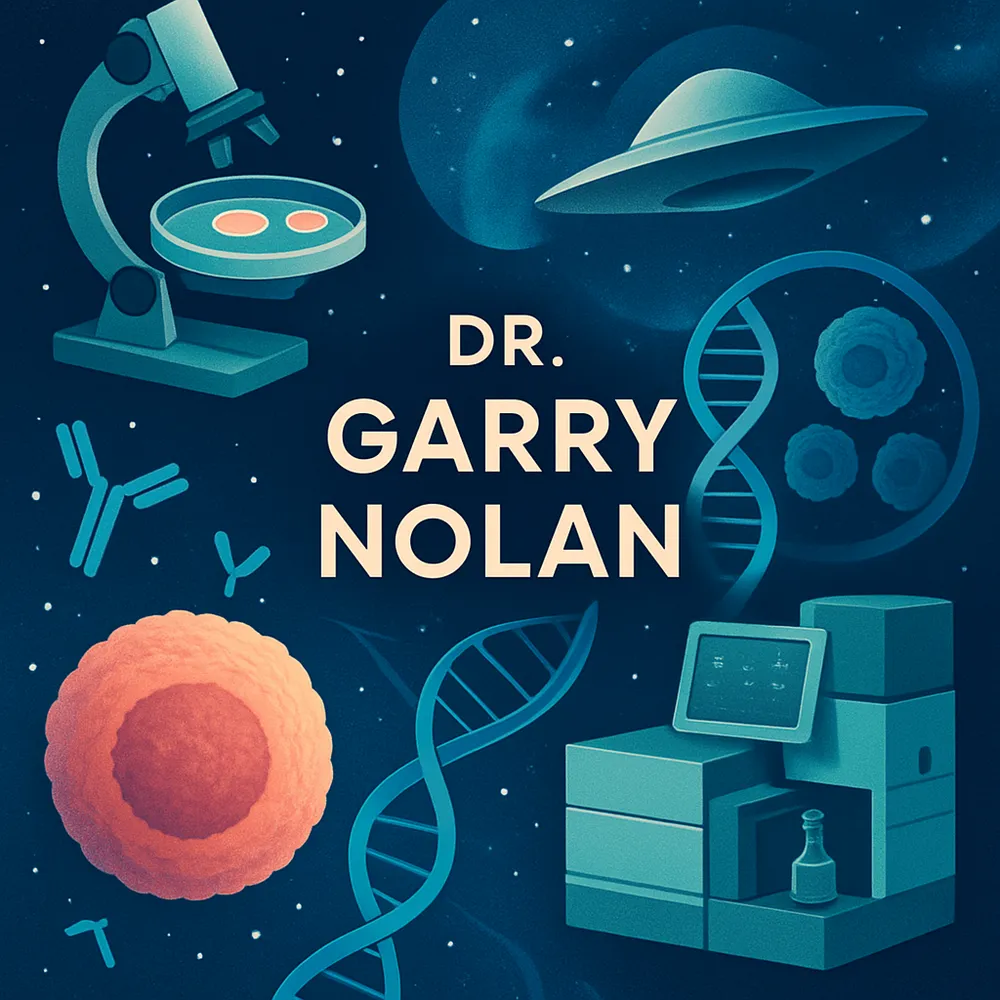Dr. Garry Nolan: A Polymath Pushing the Boundaries of Science

Dr. Garry P. Nolan stands as a towering figure in contemporary science, a distinguished immunologist, prolific inventor, and successful entrepreneur whose work spans from groundbreaking cancer research to the intriguing study of Unidentified Aerial Phenomena (UAP). As the Rachford and Carlota A. Harris Professor in the Department of Pathology at Stanford University School of Medicine, Nolan has consistently demonstrated a remarkable ability to innovate and challenge conventional scientific paradigms.
From Fundamental Immunology to Cutting-Edge Therapies
Nolan's academic journey is rooted in a deep understanding of fundamental biological processes. After earning his B.S. in biology from Cornell University, he pursued his Ph.D. in genetics at Stanford, where he trained under the esteemed Leonard Herzenberg. His postdoctoral work with Nobel laureate Dr. David Baltimore at MIT was pivotal, leading to significant discoveries concerning NF-κB, a critical protein complex involved in immune responses and cellular regulation.
His research at Stanford has consistently pushed the frontiers of immunology and cancer biology. Dr. Nolan's laboratory is renowned for its work in:
- Hematopoiesis: Unraveling the intricate processes of blood cell formation.
- Cancer and Leukemia: Developing innovative diagnostic tools and therapeutic strategies.
- Autoimmunity and Inflammation: Investigating the underlying mechanisms of these complex diseases.
- Computational Approaches for Network and Systems Immunology: Pioneering the use of advanced computational methods to analyze and model the immune system as a complex network.
One of Nolan's most impactful contributions is the development of revolutionary single-cell analysis technologies. The CyTOF (Cytometry by Time-Of-Flight) and MIBI (Multiparameter Ion Beam Imager) platforms have transformed the way researchers study cellular complexities, allowing for an unprecedented level of detail in analyzing immune responses and disease progression. Furthermore, his work on CODEX has made high-dimensional imaging more accessible, converting standard fluorescence microscopes into powerful tools for biological discovery.
A Visionary Entrepreneur
Beyond his academic prowess, Dr. Nolan is a serial entrepreneur, translating his scientific discoveries into tangible innovations through the founding of several successful biotechnology companies. These ventures include:
- Rigel, Inc.: Focused on developing small-molecule drugs for various diseases.
- Nodality, Inc.: A pioneer in personalized diagnostics for cancer and autoimmune conditions.
- BINA Technology: A big data company acquired by Roche, highlighting the value of his computational insights.
- Apprise: Specializing in advanced cell analysis using split-pool technology, also acquired by Roche.
- Akoya Biosciences: Commercializing the groundbreaking CODEX technology, making high-dimensional spatial biology accessible to a wider research community.
These entrepreneurial endeavors underscore Nolan's commitment to bridging the gap between basic scientific research and real-world applications, bringing new tools and treatments to the forefront of medicine.
Exploring the Enigma: UAP and Extraterrestrial Intelligence
In recent years, Dr. Nolan has garnered significant public attention for his controversial yet scientifically rigorous engagement with the phenomenon of Unidentified Aerial Phenomena (UAP) and the question of extraterrestrial intelligence. Approaching this topic with the same analytical rigor he applies to his immunology research, Nolan has publicly stated his belief that extraterrestrial intelligence has visited Earth.
His involvement includes the scientific analysis of alleged materials associated with UAPs and his co-founding of The Sol Foundation. This organization is dedicated to the methodical, scientifically robust assessment and analysis of UAP, advocating for research into what it terms "non-human intelligence" (NHI). Nolan's work in this area, while drawing both support and skepticism, has undeniably brought a new level of scientific discourse to a subject often relegated to the fringes.
Conclusion: A Legacy of Innovation
Dr. Garry P. Nolan's career is a testament to the power of interdisciplinary thinking and an unwavering commitment to scientific inquiry. From his foundational contributions to immunology and cancer research to his bold exploration of UAP, Nolan embodies the spirit of a true polymath. His work continues to inspire, provoke, and push the boundaries of what is known, leaving an indelible mark on both the scientific community and the broader public consciousness.